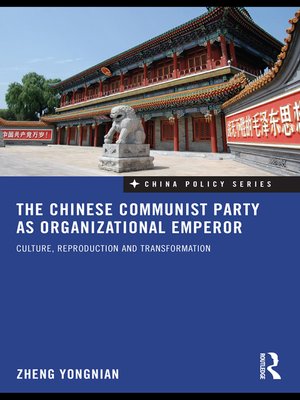The Chinese Communist Party as Organizational Emperor
ebook ∣ Culture, reproduction, and transformation · China Policy
By Zheng Yongnian

Sign up to save your library
With an OverDrive account, you can save your favorite libraries for at-a-glance information about availability. Find out more about OverDrive accounts.
Find this title in Libby, the library reading app by OverDrive.



Search for a digital library with this title
Title found at these libraries:
| Library Name | Distance |
|---|---|
| Loading... |
The Chinese Communist Party (CCP) is the largest and one of the most powerful, political organizations in the world today, which has played a crucial role in initiating most of the major reforms of the past three decades in China. China's rapid rise has enabled the CCP to extend its influence throughout the globe, but the West remains uncertain whether the CCP will survive China's ongoing socio-economic transformation and become a democratic country.
With rapid socio-economic transformation, the CCP has itself experienced drastic changes. Zheng Yongnian argues that whilst the concept of political party in China was imported, the CCP is a Chinese cultural product: it is an entirely different breed of political party from those in the West - an organizational emperor, wielding its power in a similar way to Chinese emperors of the past. Using social and political theory, this book examines the CCP's transformation in the reform era, and how it is now struggling to maintain the continuing domination of its imperial power. The author argues that the CCP has managed these changes as a proactive player throughout, and that the nature of the CCP implies that as long as the party is transforming itself in accordance to socio-economic changes, the structure of party dominion over the state and society will not be allowed to change.







